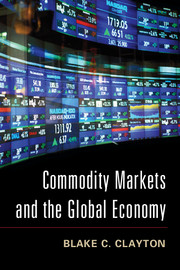Book contents
- Frontmatter
- Contents
- Foreword
- Acknowledgments
- 1 The Revenge of the Old Economy
- 2 A Twenty-First-Century Supercycle? Long-Term Trends in Metal and Energy Prices
- 3 Volatility in Global Food Markets
- 4 Commodity Markets and Financial Speculation
- 5 The Implications of Oil Prices for the U.S. Economy and Lessons Learned from the 2011 Strategic Petroleum Reserve Release
- 6 The Gold Standard as an Alternative Monetary Regime
- 7 Conclusion
- Index
1 - The Revenge of the Old Economy
Published online by Cambridge University Press: 05 October 2015
- Frontmatter
- Contents
- Foreword
- Acknowledgments
- 1 The Revenge of the Old Economy
- 2 A Twenty-First-Century Supercycle? Long-Term Trends in Metal and Energy Prices
- 3 Volatility in Global Food Markets
- 4 Commodity Markets and Financial Speculation
- 5 The Implications of Oil Prices for the U.S. Economy and Lessons Learned from the 2011 Strategic Petroleum Reserve Release
- 6 The Gold Standard as an Alternative Monetary Regime
- 7 Conclusion
- Index
Summary
In an era defined by financial upheaval, few other markets have undergone as profound a transformation over the past decade as commodity markets. Part of the change, certainly, has been in price levels: Both futures prices and volatility levels have spiked to levels not seen since the 1970s, only for volatility to dip to the placid levels more typical of the mid-1990s, as of the time this book was written. For resource producers, whether nations or companies, such generally heady price environments have marked an era of almost unprecedented bounty, while their consumer counterparts have often languished as the cost of basic materials, including essentials like food and fuel, have soared. But prices are as much symptom as cause. Behind the price swings has been a range of factors spanning trends in economic development (an increasingly wealthy Asian consumer base), demographics (a restless rising generation in the Middle East), economics (declining real interest rates across the West), geology (massive disagreement over the hydrocarbon reserve base, coupled with technological advances that have challenged the Malthusian paradigm), and politics (an OPEC at turns emboldened and in disarray). Beyond these trends, the structure, players, and pricing dynamics that make up the landscape of modern commodity markets have also undergone a sea change, with vast new sources of liquidity and rapid securitization changing the way many of the world's oldest goods change hands.
Perhaps the most remarkable aspect of the mostly erstwhile commodities boom was the unexpectedness, at least for mainstream experts, of its arrival. This was a case of boom not merely following bust, but actually being borne – suddenly – of it. In the latter half of the 1990s, the market for hard assets was as soft as nearly any time in the hundred years prior. The relative geoeconomic stability that defined the second Clinton administration, coupled with its strong dollar policies, had depressed commodity prices in dollar-denominated terms. When the Asian financial crisis bit into economic growth in the emerging world in 1998, oil prices and commodity complex more broadly tanked. At $1.24, a gallon of retail gasoline in the United States was cheaper in real terms than it had been at any time since the Arab embargo of 1973.
- Type
- Chapter
- Information
- Commodity Markets and the Global Economy , pp. 1 - 16Publisher: Cambridge University PressPrint publication year: 2015



